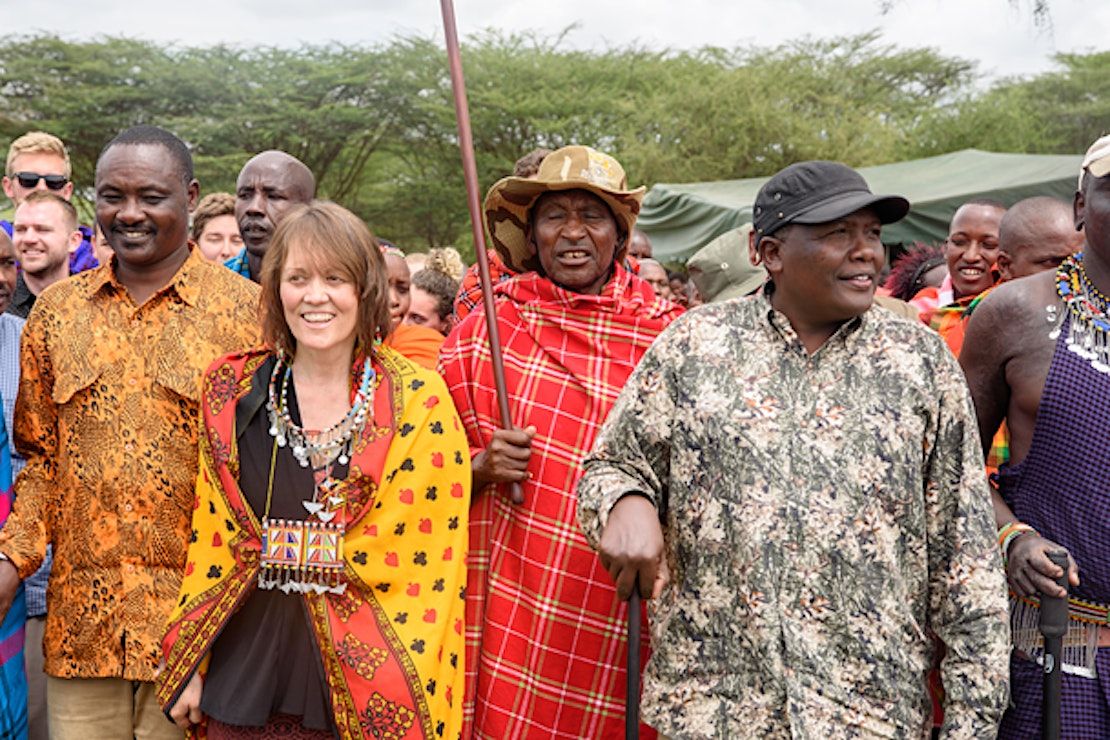
About this Event
Join us on Tuesday, January 28 at 4:00pm for an engaging conversation with Maasai leader and activist Meitamei Olol Dapash and historian Mary Poole about their new open-access book, . Their work offers a new version of Maasai history based on Maasai memory and concerns. Through their rich and detailed narrative, we learn not only about the history of the Maasai as they understand it, but also about the relations between politics and Western history; about the untold history of Kenya both pre- and post-nationhood; about why the creation of nation-states is not synonymous with liberation; and about how and why Indigenous approaches to land obstruct global processes of resource extraction. All of this finds wider resonances that upend received narratives of post-“independence” Africa and offer new opportunities for the emancipation of Indigenous communities from neo-colonial regimes the world over.

MEITAMEI OLOL DAPASH
Meitamei Olol Dapash is internationally recognized leader and activist of the Indigenous Maasai community of East Africa, whose life through the past four decades has been devoted to the cultural survival of his community: the recovery and protection of Maasai lands; the survival of pastoralism; and the rights of East African wildlife.
Raised in rural Maasailand, Meitamei founded the Maasai Environmental Resource Coalition (MERC) as a young man in the early 1980s to coordinate, resource, and represent grassroots efforts of 150 Maasai organizations and community leaders. As a director of membership and community outreach for the East African Wildlife Society, Meitamei coined the concept of community-based conservation, and traveling throughout Maasailand, he developed a vision for environmental recovery through cultural survival.
In response to a climate of political repression in Kenya, in the early 1990s Meitamei established MERC as an international NGO based in Washington D.C. There Meitamei represented the interests of Maasai people in the Species Survival Network, Cultural Survival, and at international forums including UN conventions such as the Convention International Biodiversity, Convention on Protection of Migratory Birds, the RAMSAR Commission on Wetlands, UN Commission on the Rights of Indigenous Peoples, the International Trade in Endangered Species), Convention (CITIES). He has participated in the review of World Bank’s Indigenous Peoples Operative 10.0, an instrument to minimize the impacts of WB projects on Indigenous peoples. Meitamei spoken extensively on conservation and Indigenous peoples’ issues on BBC and Voice of America, and has articles published in numerous publications including New York Times, Washington Post, Cultural Survival Quarterly, and the African Wildlife Institute Humane Society Magazine, magazines. He has been a Synergos fellow since 2011. A graduate of Edgerton College in Kenya and the Kennedy School at Harvard, Meitamei completed his PhD in Sustainability Education at Prescott College in 2024.
Meitamei ran for Parliament as an Orange Democratic Movement (ODM-Kenya) candidate in the Narok North district of Kenya in 2007, 2013 and 2017, and for Senate in 2022, typically through community grassroots party coalitions. Since 2008 he has led the Maasai movement for the return of occupied land at Mau Narok and continues to lead the “Melo Mara” movement to resist the privatization of the Maasai Mara Game Reserve. He is the author of the Loliondo Report of 2000, which exposes the commercial hunting consortium that has led over time to evictions of many tens of thousands of Maasai people in Tanzania.
Meitamei currently co-directs MERC now the Institute for Maasai Education, Research & Conservation) with Mary Poole, and is director of the Dopoi Center for Community Organizing, Education and Research. Meitamei is the founder and patron of the Mara Guides Association, a labor union representing the interests of hundreds of Maasai youth participating in the Kenya’s tourism industry. He represents the Maasai community in various policy making boards and initiatives in Kenya including being the Chair of Building Bridges Initiatives. With Mary Poole, he has authored Decolonizing History in Maasailand: A Path to Indigenous African Futures, which will be published by Zed Books in January, 2025.
Mary Poole
Mary is an historian on the faculty of Prescott College since 2003 who teaches and publishes in the arenas of U.S. and African history, with emphasis on histories of social movements, racial capitalism, colonialism, feminist and other critical social theory, and Indigenous decolonizing research methods. She came to history through a prior career in welfare policy as a fiscal analyst for the Washington State Senate, at a time of the federal dismantling of the U.S welfare state, and of rapid Pr*son expansion and the corresponding increase in racially discriminatory new drug laws. She later served as Executive Director for Early Options for Unintended Pregnancy, a non-governmental organization established to teach family practice doctors techniques of early abortion. She earned my PhD at Rutgers, where she studied the intersections of race and gender in federal welfare policy. Her first book The Segregated Origins of Social Security: African Americans and the Welfare State (UNC: 2006) demonstrates how the U.S. welfare state operates as a mechanism of racial capitalism, producing economic security as a property of whiteness.
Since the early 2000s, Mary has worked closely with East African Indigenous Maasai community leader, Meitamei Olol Dapash, on land rights, environmental justice and decolonizing research. Together we co-direct the Institute for Maasai Education, Research & Conservation (MERC) and have built together the Dopoi Center for community organizing, education and research, based in Maasailand, Southern Kenya. Our book,: Decolonizing Maasai History: A Path to Indigenous African Futures, will be published in January, 2025.
Mary has lived in Egypt, Scotland, and many places in the U.S., and currently splits her time between Prescott, Arizona and East Africa.
Event Venue & Nearby Stays
Dana Room, 4th floor, John Cotton Dana Library, 185 University Avenue, Newark, United States
USD 0.00
